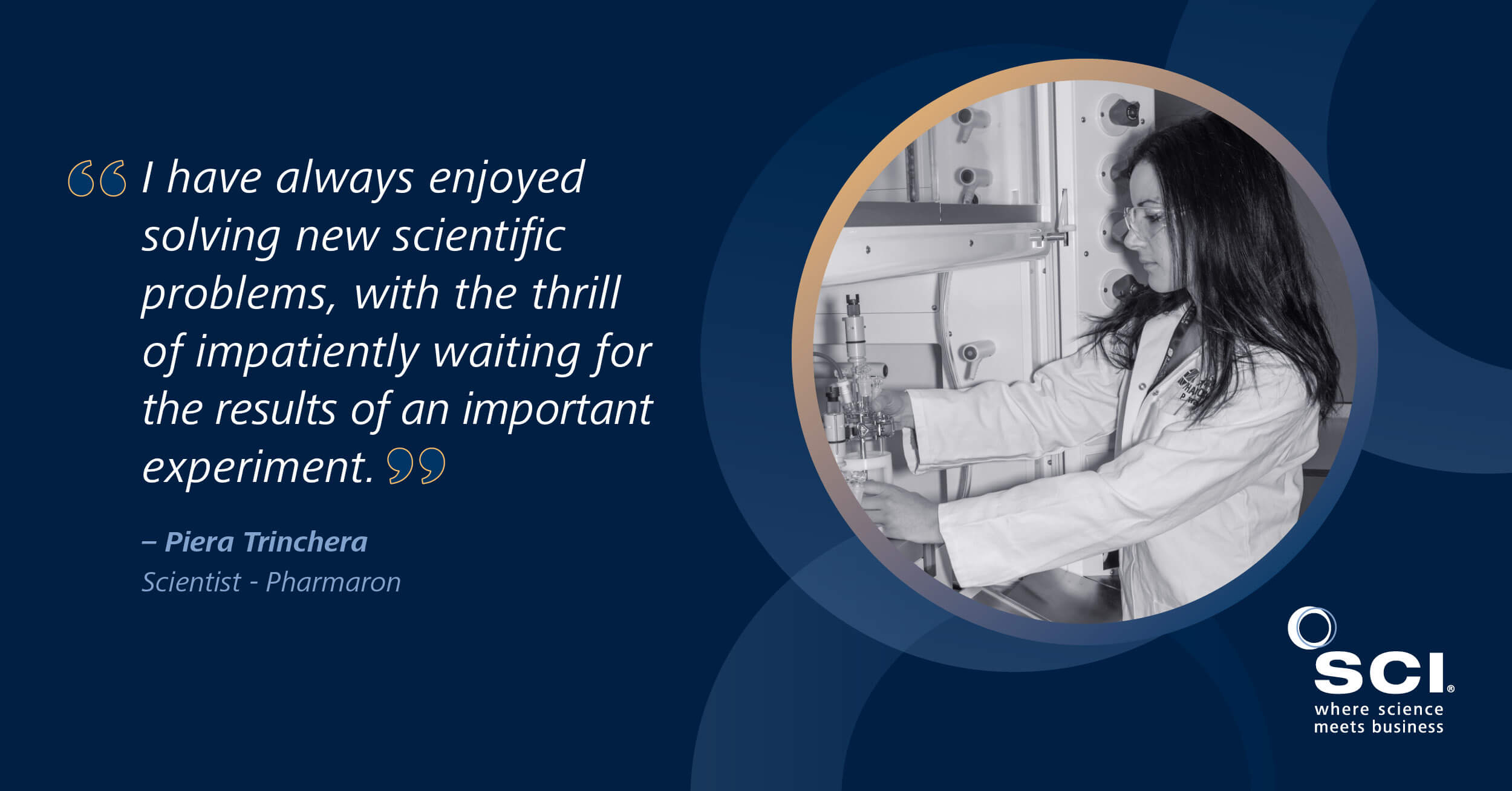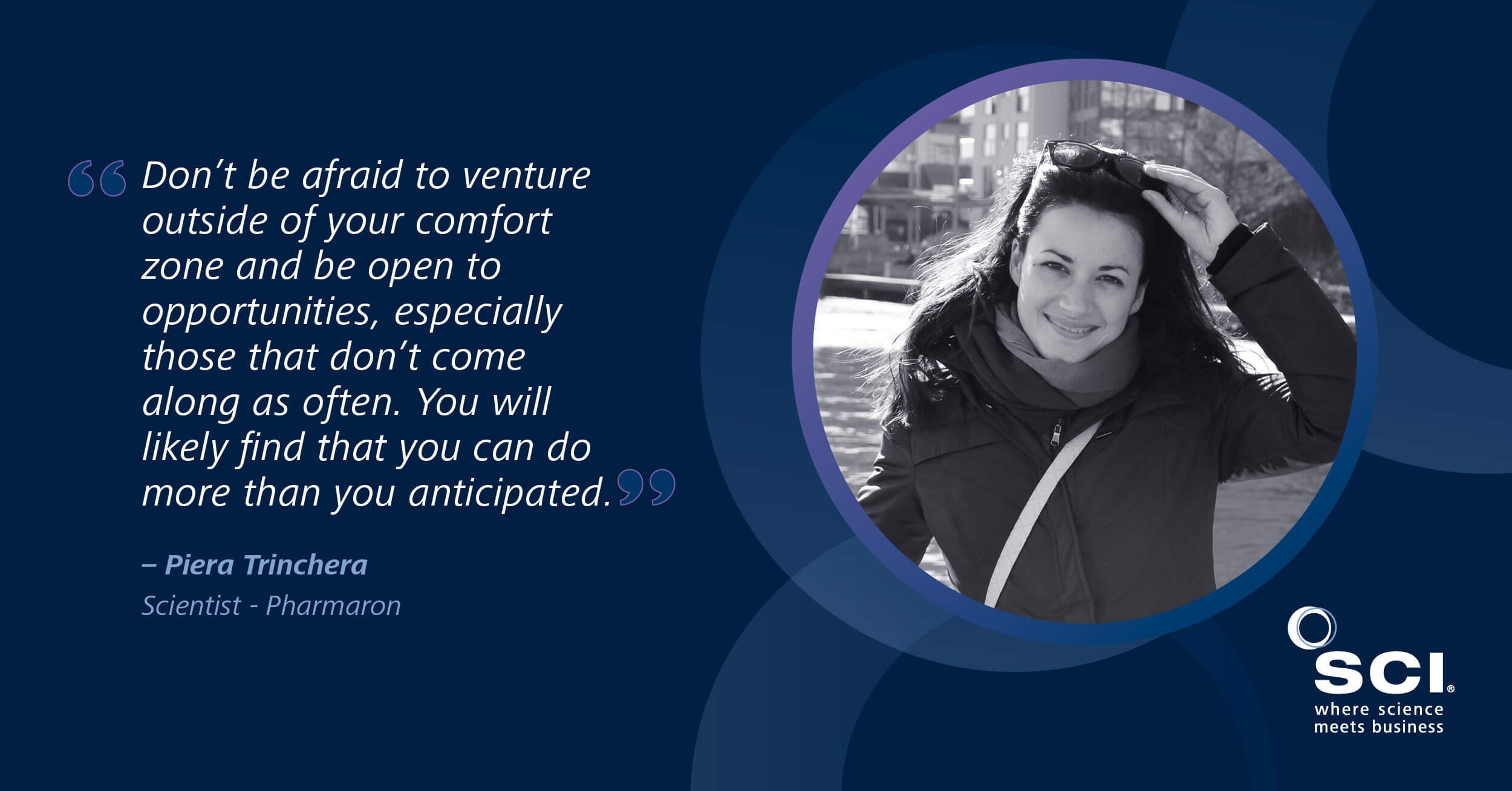How do you forge a career in process chemistry, and how do you overcome the challenges of studying in your second language? Here’s how Piera Trinchera, Associate Principal Scientist at Pharmaron, found her way.
Tell us about your career path to date.
I am an Associate Principal Scientist in the Process Chemistry department of Pharmaron UK. I am based at the Hoddesdon site in Hertfordshire, where I develop synthetic routes for the manufacture of new drugs for clinical studies.
I’m originally from Italy. I completed my MSci at the University of Salento followed by a PhD in organic chemistry at the University of Bari, focusing on new synthetic methodologies. Despite my complete lack of English at the time, I jumped at the opportunity of a six-month visiting PhD position at the University of Toronto.
This was a challenging experience initially as it was my first time living abroad, but ultimately it was very rewarding. After completing my PhD I returned to the University of Toronto to undertake a postdoctoral position focusing on organoboron chemistry. I followed this with a second postdoc at Queen Mary University of London working on aryne chemistry.
After eight years in academia, I wanted to apply the knowledge I had acquired to solving industrial problems that directly impact people’s lives. For this reason, I joined Pharmaron UK where I have been for the last three years and am currently a project lead and people manager.

What is a typical day like in your job?
I am involved in multiple projects each year and the overall aim is to provide synthetic chemistry solutions for our global clients. Depending on the type of project work, this can include either developing brand new synthetic routes to novel drug candidates or troubleshooting and improving existing chemical processes, making them suitable for large-scale manufacture.
Ultimately, the goal across all projects is the same: to support the production of large quantities of drugs that are needed for clinical studies with a line-of-sight to commercial production.
On a typical working day, I spend the majority of my time in the lab where I conduct my own experiments and lead a team of chemists who work alongside me. I am directly involved in the planning and designing of experiments, execution in the lab, and subsequent manufacture on multi-kg scale in our pilot plant.
Over the course of a project, a large part of the job is communicating to the clients the project strategy, scientific results, and timelines through regular teleconferences, emails, and written reports.
>> Read how side projects made large waves for Dr Claire McMullin
Which aspects of your job do you enjoy the most?
There are many aspects of this job that I enjoy. I have always enjoyed solving new scientific problems, with the thrill of impatiently waiting for the results of an important experiment or the curiosity in trying to understand an unexpected result.
In addition to the science, seeing your day-to-day lab work translated to the production of kg-quantities of new pharmaceutical compounds that might, after clinical studies, further global health is very rewarding.
Projects are completed on much shorter time frames than in academia (three to six months) and there is no time to stagnate as one so often does in a PhD or Postdoc. I enjoy the large breadth in the chemistry and the different challenges that come with each and every project.
Last but not least, it takes many people from different departments (e.g. in analysis, quality assurance, or manufacturing) working closely together to manufacture a drug compound on a kg-scale.
Working so closely with people from different backgrounds has tremendously enriched me during these years in Pharmaron. It has allowed me to acquire new technical knowledge and given me a deeper understanding of not just chemistry but the overall requirements for synthesising pharmaceutical compounds.
What is the most challenging part of your job?
Preparation of a synthetic process for manufacture on a kg-scale involves considerable development in the laboratory to ensure the chemistry translates from small to large scale. Part of this development is to identify potential issues and blindspots of the chemistry and processes and mitigate them by improving the process before implementation on a large scale.
Despite all these efforts, unforeseen complications do occasionally occur on the large scale and finding solutions in real time can be the most challenging aspect of the job. By keeping a clear head, the chemist can leverage both their deep knowledge of the process and the experience of their more senior colleagues to solve these problems.
How do you use the skills you obtained during your PhD and postdocs in your job?
As I’m in a synthetic chemistry job, I have benefitted enormously from the theoretical organic chemistry knowledge and practical laboratory skills that I acquired over the course of my PhD and postdoc years.
Additionally, in academia I became familiar and confident with other skills that I use on a daily basis. These include scientific communication through either written reports or oral presentations, conforming to good laboratory safety practices, and supervising and mentoring other people.
In general, the overall experience of my post-graduate academic education has provided me with the competencies necessary to scientifically manage projects and lead a team in Pharmaron.>> Get involved in the SCI Young Chemists’ Panel.
Which other skills do you need for your work?
Teamwork is a cornerstone of the job and company’s culture. The synthesis of pharmaceutical compounds according to our quality standards would not be possible without the contribution from, and close collaboration among, multiple people across several departments including analytical chemistry, process chemistry, process safety, quality assurance, formulation and manufacturing.
Is there any advice you would give to others interested in pursuing a similar career path?
Don’t be afraid to venture outside of your comfort zone and be open to opportunities, especially those that don’t come along as often. This will help you build your confidence and you will likely find that you can do more than you anticipated. If you are interested in process chemistry, I would recommend looking into internships and/or finding a mentor who can give you an insight into the job.
As with research, perseverance is an important skill you need to master. You will experience failed reactions and difficult purifications at some point in your career as a process chemist. Be open minded, ask questions and don’t be afraid to seek out support from your colleagues.
>> Read how Ofgem’s Dr Chris Unsworth creates an inclusive working environment and transfers his PhD skills.





